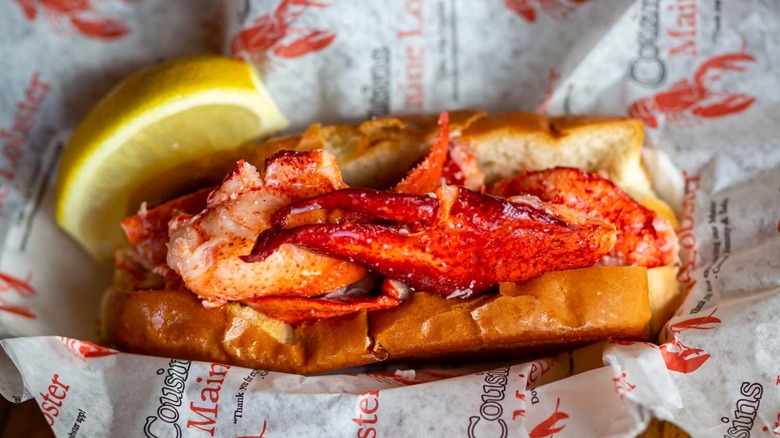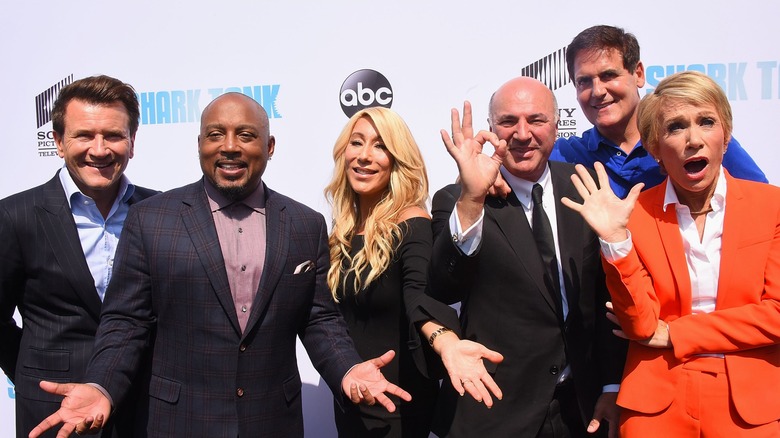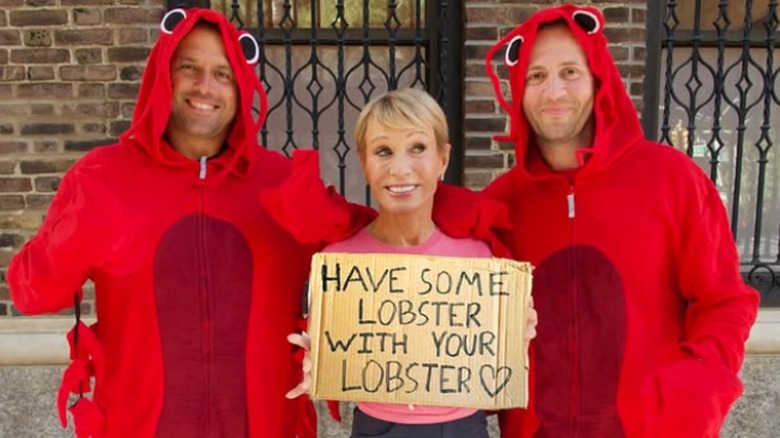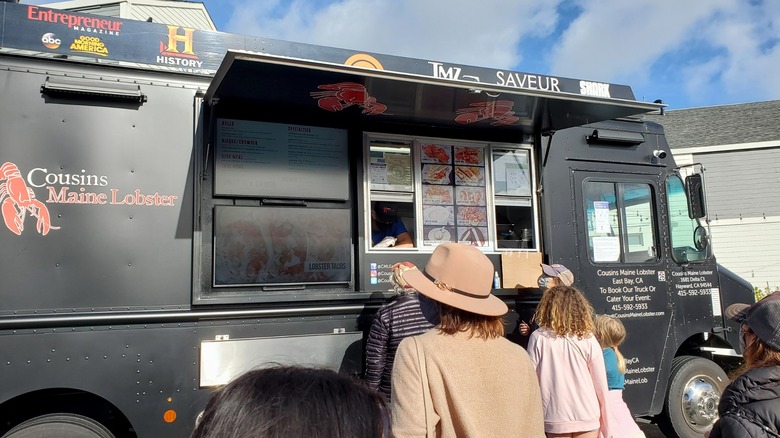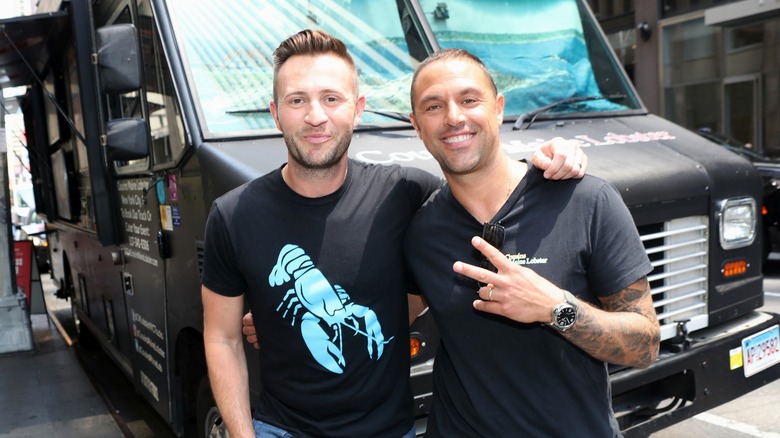Cousins Maine Lobster: Here's What Happened After Appearing On Shark Tank
Maine natives Jim Tselikis and Sabin Lomac grew up exploring the great outdoors in their home state and enjoying meals composed of the region's claim to fame: lobster. The two cousins eventually earned degrees at separate universities, but found themselves together again on the opposite side of the country in California in 2011. While they enjoyed living in the Golden State, they often discussed all the great memories they made together in Maine, much of which centered around the ritual of breaking apart lobster shells at family gatherings to get to the enticing, juicy meat inside.
They noticed that the West Coast was missing out on the experience of eating fresh lobster unless you went to a fine dining establishment and shelled out a considerable sum of money for what was, in their eyes, a lackluster portion. The cousins thought that with their connections in Maine, they could ship fresh lobster to California and sell it in the form of lobster rolls. They gathered enough money to buy a food truck and set out to bring California a taste of the East Coast via Cousins Maine Lobster.
The truck was such a success that the duo had trouble keeping up with demand. Not long into their journey, they were offered an appearance on ABC's "Shark Tank" to expand the business, but they initially declined. As Tselikis told QSR, "We said no twice, and then eventually, an executive producer called and said, 'you guys will be making the worst decision of your lives if you don't do this. So about 2.5 months into business, we were on the set of 'Shark Tank.'"
What happened to Cousins Maine Lobster on Shark Tank?
Before the cousins walked into the tank, they spent weeks studying the show and practicing how they would try to get one of the sharks to bite into Cousins Maine Lobster. When they walked out and told the venture capitalists they were seeking $55,000 for 5% of the company, the disturbed looks on the sharks' faces were unsettling. It was obvious they thought the cousins' valuation was too high, but the duo continued their pitch and let everyone try two different Maine and Connecticut-style lobster rolls.
The sharks loved the cuisine, but the $1.1 million valuation was hard to swallow. Mark Cuban started pressing them about the economics of the food truck, and the cousins attempted to answer while also fielding questions from the other sharks. Cuban was put off by Tselikis and Lomac not giving him answers in a timely fashion, and quickly jumped ship. Daymond John asked how much equity the founders would be willing to give up; when they replied that they could go up to 8%, he was out. Kevin O'Leary didn't even attempt to get more equity in the deal and removed himself from the negotiations as well.
Robert Herjavec was interested because he liked how hard the duo worked, offering $55,000 for a 20% stake in the company. Barbara Corcoran quickly followed with the same monetary offer for 17% equity. Tselikis and Lomac countered with 12%, and Corcoran suggested meeting in the middle at 15%. The cousins thought it over for a moment before Lomac looked back and said, "Barbara, welcome to the family" (via Hulu).
Cousins Maine Lobster after Shark Tank
With enough money in hand to get another food truck, Cousins Maine Lobster was off to the races. They soon expanded their lobster roll empire to four food trucks selling Maine's staple specialty to hungry customers all over Southern California. However, the partnership with Corcoran came with more than just much-needed funds. The food truck business was showcased on "Master Chef," "Good Morning America," and "The Chew," among other programs that garnered attention from all over the country thanks to Corcoran's connections.
Just three years after appearing on "Shark Tank," Tselikis and Lomac had a fleet of 18 food trucks and began bolstering the company through franchising, which was a strategy devised by Corcoran. They had amassed $15 million in sales in those three years and spread into territories across the country like Houston, Texas, and Atlanta, Georgia. Still, as impressive as their fast growth was, it was really only the tip of the iceberg.
Is Cousins Maine Lobster still in business?
Those 18 food trucks were just the beginning for Cousins Maine Lobster. By 2022, the business increased its footprint to include 36 food trucks and 7 standalone restaurant locations across the U.S. In 2017, the company went international, opening a franchise in Taiwan. Tselikis said of the restaurant locations, "They too are smaller and quick serve. People can grab their food, go to the beach, grab the food, go to the park" (via QSR).
In 2021, the business made over $54 million in annual sales. On top of the food trucks and brick-and-mortar establishments, Cousins Maine Lobster started selling lobster tails, whole live lobster, and lobster ravioli via its website, so folks who aren't near any of the company's locations can still get a taste of fresh Maine lobster delivered right to their door. One might think that with some very healthy yearly sales, the two founders would be ready to settle down, but it seems they aren't content to sit idly by and reap the rewards their hard work landed them.
What's next for Cousins Maine Lobster?
In the spirit of thinking the sky is the limit, Cousins Maine Lobster continues to grow. The company now has more than 60 locations in the United States and new franchisees are being brought on board regularly. With 30 new locations slated to open in 2025, the business hopes to have 100 by the end of that year.
Tselikis and Lomac have also been giving back following their successful business venture. Cousins Maine Lobster has partnered with Sea Bags Maine, a business that makes totes, handbags, and accessories from recycled sailcloth, to donate to the Maine Cancer Foundation, which funds cancer research and provides care for those undergoing cancer treatment. The commitment demonstrates that the slogan on the back of the company T-shirts, "family first," extends to what they consider their greater family of Mainers.
Lomac has also long donated his time to the Big Brothers Big Sisters organization. He was once involved in the program as a "little" brother, and has since been involved as a "big" brother, accepting the award for National Big Brother of the Year in 2016. Much like the plant-based milk company Numilk after appearing on "Shark Tank," there are no signs that Cousins Maine Lobster is going to do anything but grow in the immediate future, and that the two cousins who dared to dream big will continue to live up to their "family first" slogan.
